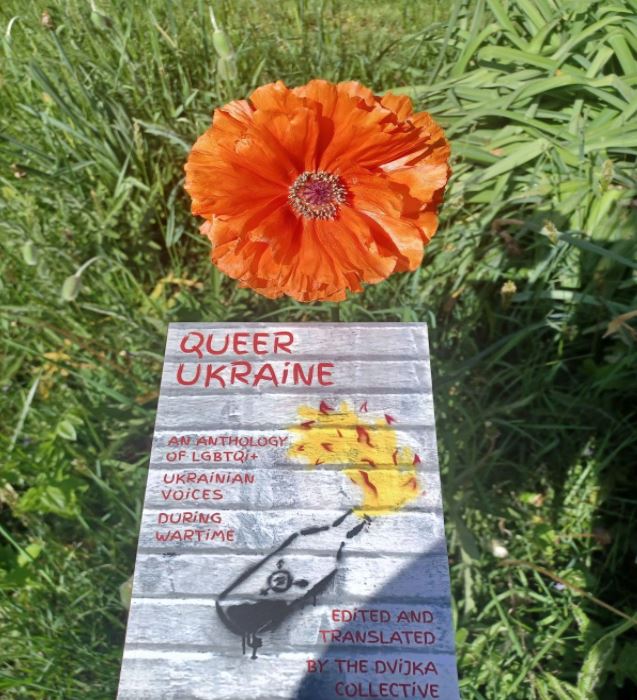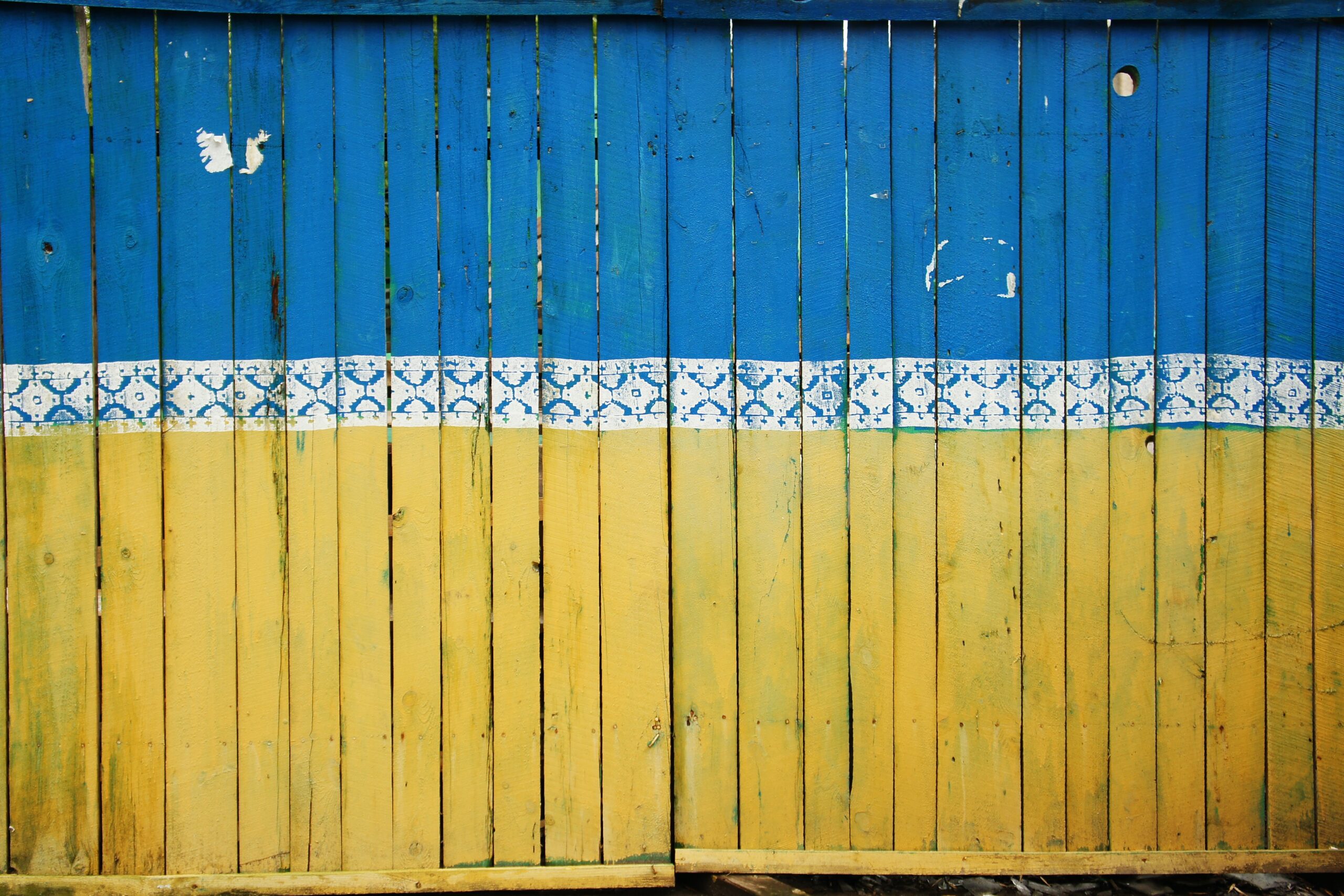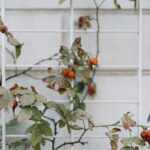by Nicole Yurcaba

After the February 2022 full-scale invasion of Ukraine, members of Ukraine’s LGBTQ community began sewing a unicorn image onto their standard-issue uniforms. For LGBTQi+ military members, the mythical beast’s image represents the non-existence many of them have faced for years not only in Ukraine’s military, but also in Ukraine. However, the full-scale invasion acted as a transformative moment for not only the Ukrainian military, but also Ukrainian society. A number of LGBTQi+ identifying people enlisted in Ukraine’s forces, and since then, their enlistment has been seen as “a catalyst for acceptance in wider society.” Renard Press’s Queer Ukraine: An Anthology of LGBTQi+ Ukrainian Voices During Wartime examines the myriad ways queerness has historically appeared in Ukrainian culture and how queerness continues to be an act of defiance and resilience in Ukrainian society.
The anthology’s foreword poses a few necessary questions that pertain not only to queer identity in Ukrainian society but also the global one: “But what is queerness if not resistance? What is queerness if not defiance? What is queerness if not the linking of arms, the echo of a hundred voices?” In Maksym Eristavi’s essay “Ukrainian Queerness,” Eristavi asserts, “It is no coincidence–it was easier for me to come out as queer than as Ukrainian–but after I did both, only then did the queerness of being Ukrainian become so apparent” because of “The resistance of it: the resistance to the attempts to erase your identity, gaslight, dehumanise, exploit and dominate you.” Ukraine’s progressive attitudes towards the LGBTQi+ community are one of the many reasons Russia launched its invasion. Russia recently passed bills which greatly threaten LGBTQi+ populations by banning the “promotion” of homosexuality. Meanwhile, in Ukraine, the country’s parliament introduced legislation giving same-sex couples partnership rights. Ukraine’s actions–nearly unthinkable a year ago–show a sharp rejection of what Politico calls Russia’s weaponization of homophobia.This weaponization ties in directly with Russian colonialist attitudes, which, according to Eristavi, portray Ukrainness and Queerness as “two equally criminal and dangerous acts of existence.” Eristavi correlates Ukraine’s broadening of human rights with “a broad decolonial awakening.”
Yana Lys continues this conversation in a series of excerpts which trace queerness and totalitarian anti-LGBTQi+ propaganda. Lys adeptly summarizes how Herodotus offered “the first ‘scientific’ study of transness in world history” when he wrote that “the Scythians who looted the temple of Aphrodite Urania” were “damned with a ‘female illness’ by the aforementioned goddess.” Herodotus describes how “some Scythians who were born male felt a feminine soul inside of them and wore feminine clothing–long dresses with capes, furs or hemp fibres.” Interestingly enough, Lys’s excerpts also highlight how past anti-LGBTQi+ ideologies and propaganda also negatively affected women. Approximately 20,000 Ukrainian women “were subjected to varying degrees of punishment following accusations of witchcraft.” A common theme threads through both Eristavi and Lys’s essays: how, as a vulnerable community during wartime, LGBTQi+ people are more vulnerable to persecution, and how Ukrainian identity and queerness present experiences of surviving, resisting, and prevailing despite a continual threat by Russian oppression.
Another thematic thread throughout the anthology is that of erasure. The analysis of colonization’s influence on anti-LGBTQi+ propaganda and how it contributes to erasure continues in Ernest Huk’s piece, “The Emancipation of Ernie.” In it, Huk asserts, “For too long, we were fed up with imported narratives on our own history as part of colonisation, either from the East or West, and they have to be immediately eradicated if we are to sustain our sovereignty.” Huk, too, correlates the Ukrainian fight for existence with the LBGTQi+ community’s fight for representation and equal rights. Huk defines Ukrainian nationalism as “anti-colonial.” In the essay “Family,” Oleksandr Bosivski posits that “Ultimately, like a planet that’s facing the erasure of living organisms, flora and fauna, queerness will prevail, if it is the last thing it does.” Bosivski also adds a bold aside: “(Just as Ukraine will win, because it’s the only thing that’s left for it to do.)” Elliot Miskovicz incorporates the long-stemmed history of the Soviet practice of erasure via relocation and genocide in their beautifully poetic essay, “Tuning the Bandura.” Miskovicz specifically focuses on the resilience of the Jewish diaspora and then the brutality of Operation Vistula, during which Soviet authorities forcibly relocated Lemko and Boyko Ukrainians. They write, “Tyrants across centuries have displaced us from our homes and taken our lives, but they can never take away our songs. To carry these songs forward is an act of resistance. For Ukrainians, this is also a story.” But what happens when the story seems like mere entertainment for others?
In the anthology’s final piece, titled “Entry (25th April 2022)” by T, the importance of writing during wartime takes center attention. However, T poses some very difficult questions, ones which resonate loudly as the war in Ukraine continues claiming lives and maiming thousands. The questions, nonetheless, are also synonymous with the LGBTQi+ community’s fight for equality. The piece’s speaker asks, “Does our agony enthrall you? Is our atrophy appealing?” The speaker also asserts, “There’s no artistry in a massacre, I want to say. It isn’t something we write about; it’s something we carry.” Like Miskovicz’s essay, T’s emphasizes the generational trauma and generational resistance inherent in Ukrainians.
In Queer Ukraine, a multitude of individual voices gather together to create a unique archive. The pieces in this book share what it means to be Ukrainian, what it means to be queer, and what it means to be human. This anthology is a call for solidarity and a demand for the necessary decolonization of narratives which have harmed both Ukrainians and the LGBTQi+ community for far too long.
Nicole Yurcaba (Ukrainian: Нікола Юрцаба–Nikola Yurtsaba) is a Ukrainian (Hutsul/Lemko) American poet and essayist. Her poems and essays have appeared in The Atlanta Review, The Lindenwood Review, Whiskey Island, Raven Chronicles, West Trade Review, Appalachian Heritage, North of Oxford, and many other online and print journals. Nicole teaches poetry workshops for Southern New Hampshire University and is a guest book reviewer for Sage Cigarettes, Tupelo Quarterly, Colorado Review, and The Southern Review of Books.



Add your first comment to this post